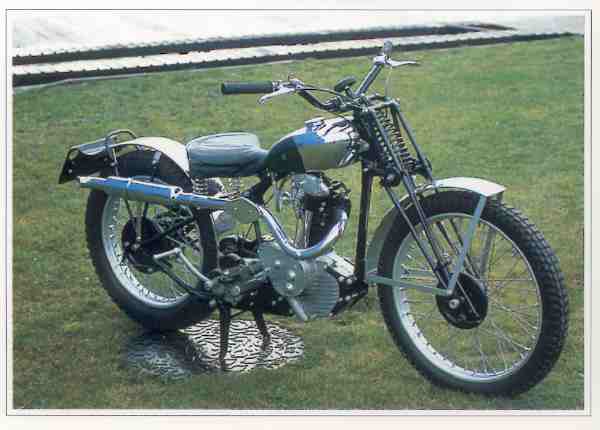
Photo ou archives : F-M. Dumas
4807
PANTHER
250 Stroud Trials - 1934
Special edition
After the disastrous experience of its clever but gutless Panthette 250 transverse V-twin in 1929, Panther launched a more economical two-stroke Villiers-powered 250, using the Panthette frame that the Cleckheaton company had over-bought in anticipation of success.
Own-Make Engine
The two-stroke sold well enough to inspire the marque to develop a 250 with an own-make engine, launched in 1932 as the Model 30. With a conventional cycle part, it was powered by a four-stroke engine scaled down from the inclined 500 designed by Granville Bradshaw, and thus returned to the marque's traditional image.
Trials and Tribulations
The engine's crankshaft was massive and its crankcase extended forward to act as an oil reservoir. It had exposed overhead-valves, with pushrods enclosed in a single chromed tube. Capable of 60 mph, the new 250 was available in two versions, the 200 lb "30 Standard," built to escape a motorcycle tax, and a twin-port deluxe with the option of four speeds. In 1932, three Standard 250s were entered in the Scottish Six Days' Trial and won a gold and a bronze medal. To counter the Depression, the 250 was built in a no-frills "Red Panther" version, which sold for less than $135. It was so successful that the 200 workers turned out over 100 a week. In 1934, the works unveiled a special trials version named the Stroud, in honor of Panther's victory in the Stroud Team Trial. It differed from the production 250 Redwing in using flat steel mudguards, wheels shod with "knobbly" tires and a sump shield under the engine.
SPECIFICATIONS
Engine: 248cc (60x88mm) or 348cc (71x88mm) air-cooled single-cylinder four-stroke; coil or magneto ignition
Power Rating: 11 hp/15 hp
Valves: overhead
Fuel System: carburetor
Transmission: Burman 3-speed, chain final drive
Suspension: girder forks (front); rigid (rear)
Brakes: drum (front & rear)
Wheels: 27x2.75 inch (front); 27x4.00 inch (rear)
Weight: 198 lb
Built in tiny numbers to special order up to 1938, the Panther Stroud bad its greatest success in the 350 class of the 1935 Scottish Six Days' Trial.